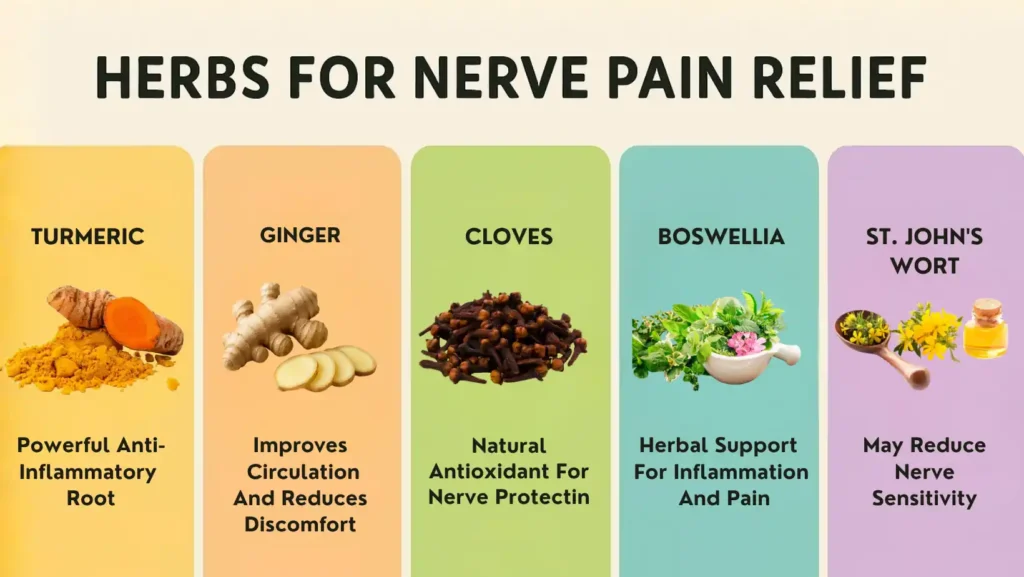Natural remedies for nerve pain help you calm burning, tingling, and pins and needles without heavy drugs. They work best when you fix causes, move your body, sleep well, and eat for lower inflammation. You can use warm and cold care, safe herbs, key vitamins, and simple daily habits. You should also know when to stop and see a doctor.
Table of Contents
ToggleWhat Causes Nerve Pain?
Common Causes Like Diabetes, Injury, Or Vitamin Deficiency
- Diabetes is a leading cause. High blood sugar harms tiny nerves in feet and hands. You feel burning at night or numb toes.
- Injury can start pain after a cut, crush, or slipped disc. Nerves get squeezed and misfire. Infections can irritate nerves. Shingles can leave pain after the rash fades.
- Alcohol excess can damage nerves over time.
- A lack of vitamin B12 leads to numb feet, weak legs, and fatigue.
- Some medicines have nerve side effects.
Your doctor can test for blood sugar issues, B12 levels, thyroid problems, and more. Fixing the source makes natural remedies for nerve pain more effective.
How Inflammation And Nerve Damage Contribute To Pain
Inflammation is the body’s alarm system. When it stays high, nerves become jumpy. Damaged nerves send messy signals. Light touch can feel sharp. Cooling inflammation helps calm those signals. Protecting the nerve helps it repair. This is where natural nerve pain treatments shine. You lower the alarm with food, sleep, movement, and selected supplements.
Role Of Lifestyle And Diet In Nerve Health
Blood sugar spikes inflame nerves. Poor sleep turns the pain dial up. Stress keeps muscles tight and pain loud. Gentle movement brings blood and oxygen. When you build this base, home remedies for nerve pain relief work better and last longer. When you skip it, nothing holds.
Home Remedies For Nerve Pain Relief
Warm Foot Baths To Relax Nerve Endings
Warmth relaxes tight muscles and soothes sore skin.
- Fill a basin with warm water.
- Test it with your hand before soaking.
- Add Epsom salt if your skin is intact.
- Soak hands or feet for 10 to 15 minutes.
- Do it at night to reduce bedtime flare-ups.
Pair the soak with slow breaths to calm your system. This is one of the simplest home remedies for nerve pain relief you can use any day.
Cold Compresses To Reduce Swelling And Discomfort
Cold numbs sharp pain and tames swelling.
- Wrap ice in a thin towel. Place it on the sore spot for 10 minutes.
- Take a 10-minute break. Repeat two to three cycles.
- Never place ice directly on skin.
- Use cold after long walks or when pain flares.
Alternating warm and cold can help if one alone is not enough.
Gentle Massage To Improve Blood Circulation
Soft massage boosts blood flow and eases tight fascia (the body’s thin inner wrap).
- Use a small amount of coconut or olive oil.
- Make light circles from far to near the heart.
- Stop if tingling spikes during massage.
- Tcoconut or ry five minutes before bed.
- Add a drop of diluted lavender oil if you want extra relaxation.
Massage pairs well with herbs for nerve pain relief you take in the day.
Compression Socks For Better Nerve Support
Mild compression helps if swelling and poor flow make pain worse. Choose light to medium compression. Put them on in the morning and remove them at night. Do not use tight compression if you have severe artery disease unless a clinician approves. Replace pairs every few months since elasticity fades. Many people find steadier comfort with this simple tool.
Regular Stretching And Low-Impact Exercise
Stiff tissue can tug on nerves. Short daily stretches loosen that pull. Hold gentle calf and hamstring stretches for 20 seconds. Avoid bouncing. Add easy walking or cycling. Five minutes is fine to start. Add two minutes every few days. This habit is a strong nerve pain and exercise natural remedy that builds blood flow and mood with low risk. It also supports your other natural remedies for nerve pain
Herbs For Nerve Pain Relief
Turmeric: Powerful Anti-Inflammatory Root
Turmeric carries curcumin. Curcumin helps cool the body’s alarm. You can cook with turmeric daily. Add black pepper to aid absorption. Many people notice easier movement and less burning after steady use. If you take blood thinners, ask your clinician before using capsules. Turmeric often anchors herbs for nerve pain relief in both food and supplements.
Ginger: Improves Circulation And Reduces Discomfort
Ginger warms the body and may block some pain signals. Drink ginger tea once or twice a day. Fresh ginger in stir-fries or soups works as well. If you use blood thinners or have gallstones, get medical advice first. Ginger stacks nicely with turmeric and forms a core part of natural remedies for nerve pain in many kitchens.
Cloves: Natural Antioxidant For Nerve Protection
Cloves contain eugenol. Eugenol has strong antioxidant action that may guard nerve cells from stress. Use clove powder in oatmeal or tea. You can try diluted clove oil on the skin for comfort. Test a small area first. Avoid long use inside the mouth, which can irritate tissue. Clove fits into herbs for nerve pain relief when used in small, safe amounts.
Boswellia: Herbal Support For Inflammation And Pain
Boswellia is a resin extract. People use it to ease joint swelling and stiffness. It may help nerve-related pain where inflammation is a driver. Quality matters. Choose products with stated boswellic acids. If you already take anti-inflammatory drugs, ask a clinician about timing and dose.
St. John’s Wort: May Reduce Nerve Sensitivity
St. John’s Wort can affect pain and mood. It interacts with many medicines. It can reduce the effect of birth control pills. It can change levels of blood thinners and some heart drugs. Do not start without medical advice. If cleared, it can help select cases of nerve sensitivity. Respect its risks while using natural remedies for nerve pain
Supplements For Nerve Pain
Vitamin B12 For Nerve Repair And Regeneration
Nerves need B12 for healthy myelin (the protective nerve coating). Low B12 causes numbness, tingling, poor balance, and fatigue. Your clinician can check blood levels.
If low, you may need pills or shots. Food sources include fish, meat, eggs, and dairy. B12 is one of the most effective supplements for nerve pain when a deficiency exists. Correcting B12 often reduces symptoms within weeks.
Alpha-Lipoic Acid For Diabetic Neuropathy
Alpha-lipoic acid is an antioxidant that works in water and fat. It helps calm burning and pins and needles in diabetes. Typical oral doses range from 300 to 600 milligrams daily. It can lower blood sugar.
If you use insulin or pills, monitor sugar more often when you start. This is one of the supplements for nerve pain with good evidence in diabetic neuropathy.
Magnesium To Relax Muscles And Reduce Cramping
Magnesium supports muscle relaxation and nerve signaling. Many adults fall short on intake. Try magnesium glycinate at night to aid sleep and reduce cramps. Start low to avoid loose stools. Dark greens, beans, nuts, and seeds add natural magnesium. Better sleep can lower next-day pain, which helps your natural remedies for nerve pain routine stick.
Omega-3 Fatty Acids For Nerve Healing Support
Omega-3s build healthy cell membranes and may aid nerve repair. Eat salmon, sardines, mackerel, walnuts, and ground flax. If you choose fish oil, look for combined EPA and DHA on the label. Take with food to reduce burps. Omega-3s are reliable supplements for nerve pain that also support heart and brain health.
Herbal Capsules And Natural Blends For Chronic Pain
Many blends mix curcumin, ginger, boswellia, and black pepper. Some add ashwagandha to reduce stress load. Add one product at a time so you can judge the effect. Buy from brands that test for purity. Keep a two-week log of dose, time, and results. Smart tracking turns supplements for nerve pain into a focused plan rather than guesswork.
Nerve Pain And Exercise:
Benefits Of Yoga And Gentle Stretching For Nerve Repair
Gentle yoga improves posture and breath. That reduces pressure on irritated nerves. Pick easy poses such as child’s pose, cat to cow, and seated forward fold. Move slowly and stop before pain. Even five to ten minutes helps. This is a dependable nerve pain and exercise natural remedy that costs little and supports steady healing.
Walking And Low-Impact Workouts For Better Circulation
Walking is simple and powerful. It brings oxygen and nutrients to nerves. Start with ten minutes at an easy pace. Add two minutes every few days. If walking hurts, try a recumbent bike or pool walking. Pair activity with a warm soak after to prevent flare-ups. The habit stacks well with home remedies for nerve pain relief you already use.
Tai Chi And Mindful Movement For Pain Control
Tai chi uses slow moves and deep breathing. It improves balance and mood. Calm nerves fire fewer false alarms. Try a short beginner class or a trusted video. Practice ten to fifteen minutes most days. It is another nerve pain and exercise natural remedy that builds control without strain.
Importance Of Consistency In Physical Therapy Routines
A plan only works when you repeat it. Set three core moves and do them on most days. Keep a small notebook. Note pain at start and finish. Aim for steady progress, not perfect days. Consistency supports all-natural remedies for nerve pain and helps you notice what truly works.
Stress Management And Sleep For Nerve Health
How Chronic Stress Worsens Nerve Inflammation
Stress keeps the body in fight mode. Sugar rises. Muscles tense. Pain feels louder. When you lower stress, you lower inflammation. You also make better choices with food and movement. That is why stress care belongs beside natural remedies for nerve pain like herbs, vitamins, and warm soaks.
Relaxation Practices Like Meditation And Breathing
Use a simple 4–6 breath. Inhale for four counts. Exhale for six counts. Repeat for three minutes. Do it before meals and at bedtime. Short guided meditations help if thoughts race. These drills teach your nervous system to quiet down. They also pair well with nerve pain natural treatments such as gentle yoga.
Sleep Hygiene Tips To Support Nerve Recovery
Sleep is your repair window. Keep the same sleep and wake times daily. Darken your room and cool it slightly. Shut screens one hour before bed. Try a warm bath and light stretch. Avoid large meals late. Better sleep lowers next-day pain. It supports every tool in your natural remedies for nerve pain plan.
Role Of Emotional Well-Being In Pain Perception
Low mood and worry raise pain perception. Talk to someone you trust. Use a support group if you feel alone. If mood stays low for weeks, seek clinical help. Treating mood does not mean the pain is “in your head.” It means you are reducing one major pain amplifier.
Dietary Changes That Support Nerve Healing
Anti-Inflammatory Foods That Nourish Nerves
Food can turn pain up or down. Build your plate around plants and omega-3-rich choices. Fill half the plate with leafy greens, carrots, peppers, onions, tomatoes, and broccoli. Add beans, lentils, and oats for steady energy.
Choose salmon, sardines, or mackerel twice a week. Use olive oil for cooking. Add walnuts and ground flax to yogurt or smoothies. This pattern lowers the body’s alarm. It also supports natural remedies for nerve pain that you use at home.
Reducing Processed Sugar And Refined Carbs
High sugar harms small nerves and blood vessels. It also causes big spikes and crashes in energy. Swap soda for water or unsweetened tea. Replace white bread with whole grain. Keep dessert for special days.
Read labels to catch added sugars in sauces and snacks. When blood sugar stays steady, pain flares less. Your sleep and mood also improve. That helps every part of your home plan.
Staying Hydrated For Nerve Conductivity
Nerve signals need fluid balance. Mild dehydration can trigger cramps or headaches. Sip water throughout the day. Aim for pale yellow urine. If you sweat during exercise, add a small pinch of salt and a squeeze of lemon to one glass. Limit alcohol since it can worsen nerve damage in high amounts. Good hydration boosts the effect of natural remedies for nerve pain without adding cost.
Best Foods To Include In A Nerve-Healing Diet
You can rotate these staples each week:
- Protein: salmon, sardines, trout, eggs, tofu, Greek yogurt.
- Carbs: oats, brown rice, quinoa, sweet potatoes, fruit.
- Veggies: spinach, kale, broccoli, beets, red cabbage.
- Fats: olive oil, avocado, walnuts, pumpkin seeds.
Natural Therapies And Alternative Treatments
Acupuncture And Acupressure For Nerve Pain
Many people report less burning and better sleep after acupuncture. It may help the body release natural pain blockers. If needles worry you, acupressure can be an option. A trained pro can show points you can press for a minute at a time.
Use these methods along with home remedies for nerve pain relief such as warm soaks and gentle stretches. This combined plan often brings steadier relief.
Essential Oils (Lavender, Peppermint, Eucalyptus)
Some oils add a soothing skin feel that distracts from pain. Lavender can relax you before bed. Peppermint and eucalyptus create a cooling sensation. Always dilute a few drops in a carrier oil like coconut oil.
Test a small patch first. Keep oils away from eyes. Do not ingest them. Oils are not a cure, but they can make nights easier.
Topical Creams With Capsaicin Or Menthol
Capsaicin creams quiet pain signals over time. They can sting at first. That fades with steady use. Apply with a glove or finger cot and wash hands after. Menthol or camphor gels cool the skin for short relief.
Try small amounts to see how your skin reacts. Rotate options to prevent irritation. These tools sit well beside natural remedies for nerve pain like movement, sleep care, and diet changes.
Electrical Stimulation Therapy (TENS) For Chronic Pain
A TENS unit sends gentle pulses through the skin. Place pads near the sore area, not directly on the spine. Start with low settings for 15 to 20 minutes. Use during daytime flares or before bed. Do not use it if you have a pacemaker unless your doctor clears it. Many people like TENS because it is drug-free and repeatable.
Preventing Nerve Pain Naturally
Managing Chronic Conditions Like Diabetes And Obesity
Keep blood sugar in the target range you and your doctor set. Check your A1C on schedule. Track your steps or minutes of movement. Even a small weight drop can reduce pressure on joints and nerves. Take medicines as prescribed. These basic steps make natural remedies for nerve pain work better and last longer. They also sharpen the results from nerve pain natural treatments such as yoga and walking.
Quitting Smoking And Reducing Alcohol Intake
Smoking narrows blood vessels and starves nerves of oxygen. Alcohol in high amounts can damage nerves and disrupt sleep. Set a quit date for smoking and ask for help if needed. Cut alcohol to low or none. Your circulation will improve within weeks. Your sleep will deepen. Pain often eases when these two risks leave the picture.
Maintaining A Healthy Body Weight And Posture
Extra weight can tug on nerves through tight tissue. Poor posture can pinch nerves in the neck or lower back. Sit with both feet flat and your screen at eye level. Stand up each hour and move for two minutes. When you lift, hinge at the hips and keep the load close to your body. These small posture habits protect your progress with natural remedies for nerve pain
Regular Checkups And Early Symptom Monitoring
Do not wait for new numbness, weakness, or loss of balance. Keep a simple pain log. Note triggers, what helped, and how long the relief lasted. Bring the log to your visit. Early action prevents lasting harm and helps you avoid strong medicines later.
When To See A Doctor
Persistent Numbness Or Weakness In Limbs
If numbness or weakness lasts more than two to three weeks, call your doctor. If you notice a sudden drop in strength, seek care sooner. This can signal active nerve damage that needs quick action. Do not rely only on natural remedies for nerve pain when weakness is present.
Pain Interfering With Daily Activities Or Sleep
If pain stops you from walking, working, or sleeping, get assessed. You may need tests, nerve studies, or short-term medicine to calm a flare. Fast relief can help you restart movement and keep gains from your routine.
Signs Of Serious Underlying Nerve Damage
Call for urgent help if you have chest pain, face droop, slurred speech, sudden vision loss, or loss of bladder or bowel control. These are medical emergencies. Home care is not enough in these cases.
FAQs
What Is The Best Natural Remedy For Nerve Pain?
You get the best results when you stack tools that target different steps of pain. Diet, sleep, and movement form the base. Add warm soaks, topical creams, and safe supplements. This is how natural remedies for nerve pain bring steady relief.
Can Herbs And Supplements Really Heal Nerves?
Herbs can cool the body’s alarm while vitamins support repair. Results grow when you fix causes like high sugar and poor sleep. Start one item at a time and track your response. Do not self-mix if you take medicines.
Which Vitamins Help With Nerve Repair?
Vitamin B12 protects myelin, which is the nerve coating. Vitamin D supports muscles and mood. Omega-3s support cell membranes. Ask for blood tests before you supplement. This keeps your plan precise and safe.
Does Turmeric Help With Nerve Pain?
Turmeric adds curcumin, which helps calm inflammation. Cooking with turmeric and black pepper is a safe start. Capsules can help if your doctor agrees. Use it within natural remedies for nerve pain that include food, sleep, and movement.
What Foods Reduce Nerve Inflammation?
Leafy greens, berries, beans, whole grains, and fatty fish help cool the body’s alarm. Olive oil and nuts add healthy fats. Cut soda, fried snacks, and heavy sweets. This food base supports lasting results.
Can Exercise Improve Nerve Function Naturally?
Yes. Walking, gentle yoga, and pool work increase blood flow and reduce stiffness. Start small and be consistent. Use a log to track minutes and pain levels. Pair movement with your other tools for stronger relief.
How Long Does It Take For Natural Remedies To Work?
Some changes, like warm soaks and breath work, can help in days. Diet and sleep can take weeks to show clear gains. Nerve repair takes time. Track progress for at least eight to twelve weeks.
Is It Safe To Combine Natural And Medical Treatments?
Yes, most plans blend both. Share your full list of herbs and vitamins with your doctor. Some items interact with heart pills, blood thinners, or diabetes drugs. Safe mixing protects your results.
Can Stress Make Nerve Pain Worse?
Stress turns the pain dial up and disturbs sleep. Daily breath drills and short meditations help. A regular wind-down routine supports deeper rest. Lower stress makes your body more responsive to home remedies for nerve pain relief
About The Author

Medically reviewed by Dr. Chandril Chugh, MD, DM (Neurology)
Dr. Chandril Chugh is a U.S.-trained, board-certified neurologist with expertise in diagnosing and managing neurological disorders, including migraines, epilepsy, Parkinson’s disease, and movement disorders. His clinical focus includes evidence-based neurological care and patient education.
All content is reviewed for medical accuracy and aligned with current neurological guidelines.






